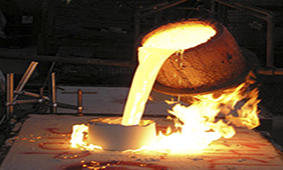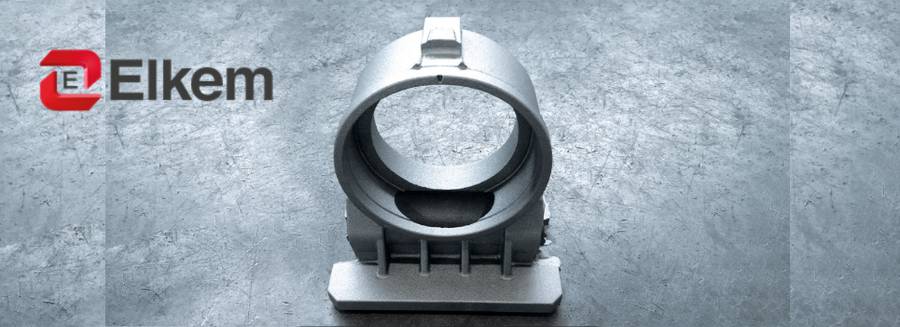
Case Study: Solving shrinkage issues in a heavy duty iron casting

In this case, a globaly leading manufacturer of ductile iron castings for crittical machinery parts experienced leakage in housing elements. They specialise in elevator traction machinery, with parts weighing up to 10 tonnes.
The problem was a shrinkage defect which was only detected after machining at the customer. The cost of the rejects was calculated at $ 365,000 per year.
Background
The customer is a globally leading manufacturer of ductile iron castings for critical machinery parts. They specialise in elevator traction machinery, with parts weighing up to 10 tonnes. Production output can easily reach 4,500 tonnes per month.
The foundry had tremendous issues with leakage in housing elements, produced in 450-10 grade. They used a 7 % Mg, 1.5 % TRE alloy as nodulariser, covered by steel coins. They then used a Ca / Ba inoculant
as a first stage and also in-stream. When the issues persisted, they contacted Elkem for advice.
Challenge
The problem was a shrinkage defect which was only detected after machining at the customer. The cost of the rejects was calculated at $ 365,000 per year.
Design solutions only resulted in minor improvements, that were insufficient for the client situation. Trials with chills improved the shrinkage defects but were not able to remove them to an acceptable level.
“This was becoming a serious issue for this particular casting. We had looked at design solutions, but with only minor improvements. Elkem’s alloy solution triggered a complete
change in the way we thought of the process.”
Solution
Together with the foundry staff, Elkem technicians went on-site and analysed the situation. One of Elkem’s regional research labs added insights from a metallurgical point of view. As a result, they recommended changing the alloying materials.
Elkem technical staff performed a trial with Lamet® 5922, a nodulariser containing 5.9 % Mg and 0.5 % La. The inoculation process was switched to a FeSi cover on the Lamet® and Ultraseed® Ce in-stream.
Results
Introducing Lamet® 5922, Ultraseed® Ce, and FeSi to the process resulted in major improvements:
Scrap rate dropped from 30 % to 2 %
Very low shrinkage level, accepted by the client
Elimination of the 0.3 % ladle inoculant
No need for chills or production process change
Cost reductions of approx. $ 365,000 per year were achieved



Trump weighs using $2 billion in CHIPS Act funding for critical minerals

Codelco cuts 2025 copper forecast after El Teniente mine collapse

Electra converts debt, launches $30M raise to jumpstart stalled cobalt refinery

Barrick’s Reko Diq in line for $410M ADB backing

Abcourt readies Sleeping Giant mill to pour first gold since 2014

Nevada army depot to serve as base for first US strategic minerals stockpile

SQM boosts lithium supply plans as prices flick higher

Viridis unveils 200Mt initial reserve for Brazil rare earth project

Tailings could meet much of US critical mineral demand – study

Kyrgyzstan kicks off underground gold mining at Kumtor

Kyrgyzstan kicks off underground gold mining at Kumtor

KoBold Metals granted lithium exploration rights in Congo

Freeport Indonesia to wrap up Gresik plant repairs by early September

Energy Fuels soars on Vulcan Elements partnership

Northern Dynasty sticks to proposal in battle to lift Pebble mine veto

Giustra-backed mining firm teams up with informal miners in Colombia

Critical Metals signs agreement to supply rare earth to US government-funded facility

China extends rare earth controls to imported material

Galan Lithium proceeds with $13M financing for Argentina project

Kyrgyzstan kicks off underground gold mining at Kumtor

Freeport Indonesia to wrap up Gresik plant repairs by early September

Energy Fuels soars on Vulcan Elements partnership

Northern Dynasty sticks to proposal in battle to lift Pebble mine veto

Giustra-backed mining firm teams up with informal miners in Colombia

Critical Metals signs agreement to supply rare earth to US government-funded facility

China extends rare earth controls to imported material

Galan Lithium proceeds with $13M financing for Argentina project

Silver price touches $39 as market weighs rate cut outlook

















